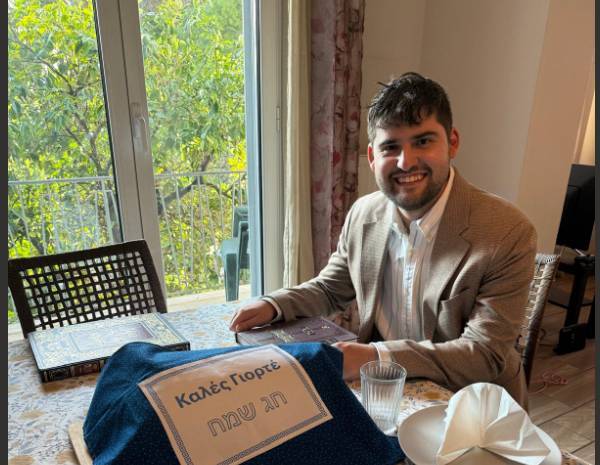 Bala Cynwyd native and current Athens resident Elisha Gordan (Courtesy of Shifra Vega and Michael Gordan)
Bala Cynwyd native and current Athens resident Elisha Gordan (Courtesy of Shifra Vega and Michael Gordan)
In Greece, there are around 5,000 Jews, comprising about 0.05% of the country’s population. Bala Cynwyd native Elisha Gordan can now count himself as one of them.
Gordan, who graduated from Brandeis University in the spring, moved to Athens in August to work with the city’s Jewish community as an assistant rabbi through the Ronald S. Lauder Foundation.
Gordan’s job is to be an extra pair of hands for local rabbis and to help with some Torah readings and minyans. He also teaches at his organization’s religious school.
His journey to Greece began after his freshman year of college, when he spent the summer working for the Lauder Foundation in Berlin. “I got to see a lot of different Jewish communities in Europe. Like, we were based there [in Berlin], but we went to four or five other places in Europe. So that was a very enriching experience,” Gordan said.
Gordan said he already had connections to Jewish Europe, as he holds a Dutch passport and has relatives in the Netherlands. But, he added, the foundation “really opened my eyes a bit to Jewish Europe as a political, communal, religious entity.” After graduating from Brandeis, Gordan used his connections with the Lauder Foundation, which is dedicated to boosting Jewish life in Europe through support for Jewish schools, to get his job in Athens.
So far, Gordan said he’s noticed several differences between the Jewish communities of Philadelphia and Athens, starting with size.
“It’s very, very small [in Athens],” he said. “And because of that, you learn very quickly, what are the core pieces of the of the Jewish community that make them function? It clarifies for you what the hierarchy of need is in a Jewish context. The communal identity formation is much more important, because it’s much weaker. Just being around other Jews is very surprising.”
He’s noticed other differences, like the lower availability of kosher goods and the types of food served at Jewish events.
“It’s cool because you see how it’s different,” he said. “[But also] you’ll see how it’s very much the same in terms of the liturgy and the practice in the synagogue. We still have kiddush here, but kiddush here is Greek food.”
Gordan said the experience over the past few months opened his eyes to things he took for granted in Philadelphia, like having a constant Jewish communal presence. Growing up, Gordan went to Abrams Hebrew Academy and Kohelet Yeshiva.
He said one of his Athens students who graduated from the local Jewish school after sixth grade experienced a small culture shock when he realized there were no other Jews at his new secular school.
But Gordan said the lack of a large Jewish presence is something that brings the Athens community together.
“The affinity space, having other Jews around, I personally took that a lot for granted in the States, but it’s not something I take for granted anymore,” Gordan said. “It doesn’t really matter what kind of a Jew they are, it’s just another Jew. It’s like there’s a brotherhood aspect to that. I think you feel it very strongly in small communities.”
Gordan said he’s enjoyed being a teacher in Athens so far and has made plenty of local connections. He said he likes helping to “raise the next generation in the faith.”
“It’s nice to teach other Jews about their religion. A lot of them, especially here, don’t know that much, and they are eager to learn. A little bit goes a long way. So, once you see that, it’s very powerful,” Gordan said.
Gordan said he’s learned a lot as well during his short time in Athens, both about Judaism and how the Jewish professional space works. He said he gained “decades of experience every month.” It’s the right time in life to gain such experience, he added, because he doesn’t have a family that he’d have to uproot and move 5,000 miles for his job.
Gordan has no doubts that his time in Athens will help him in life and his career, however it develops. “You learn how to talk to different kinds of people and you listen a lot. That’s really important, I think, to [listen to] where people are coming from, what their needs are,” Gordan said. “This is like the whole point of education. Once you have a broader perspective, you can both understand your own [perspective] better, and probably, in a fuller way, relate to the rest of the world.”